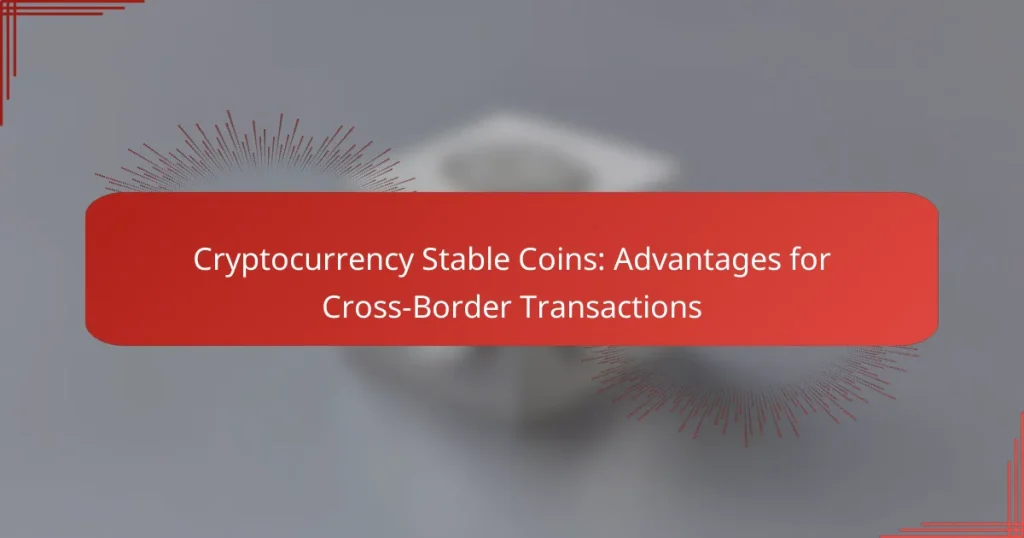Cryptocurrency stable coins play a crucial role in facilitating cross-border transactions by reducing price volatility and ensuring a stable medium for value transfer. By merging the advantages of digital currencies with the reliability of traditional fiat currencies, they provide an efficient solution for international payments. Their inherent price stability, regulatory compliance, and global accessibility make stable coins an appealing choice for businesses aiming to navigate the complexities of global trade.

How do cryptocurrency stable coins facilitate cross-border transactions?
Cryptocurrency stable coins streamline cross-border transactions by minimizing price fluctuations and providing a reliable medium for transferring value. They combine the benefits of digital currencies with the stability of traditional fiat currencies, making them ideal for international payments.
Reduced volatility
Stable coins are pegged to stable assets like the US dollar or euro, which significantly reduces their volatility compared to traditional cryptocurrencies. This stability allows users to avoid the unpredictable price swings that can occur in the crypto market, making transactions more predictable and secure.
For example, a stable coin pegged to the US dollar maintains a value close to $1, allowing users to transact without worrying about sudden changes in value that could affect the amount received by the recipient.
Lower transaction fees
Using stable coins for cross-border transactions often incurs lower fees compared to traditional banking systems or wire transfers. Many stable coin transactions can be processed on blockchain networks with minimal fees, sometimes just a few cents, regardless of the transaction size.
This cost-effectiveness is particularly beneficial for remittances, where high fees can significantly impact the amount received by the recipient. By using stable coins, senders can ensure that more of their money reaches its destination.
Faster settlement times
Stable coin transactions can be settled within minutes, unlike traditional cross-border payments that may take several days to process. This speed is due to the decentralized nature of blockchain technology, which eliminates the need for intermediaries that slow down transactions.
For instance, a person sending money from the US to Europe can complete the transaction in a matter of minutes using a stable coin, compared to the typical 3-5 business days required for bank transfers.
Increased accessibility
Stable coins enhance accessibility for individuals in regions with limited banking infrastructure. People without access to traditional banking services can use stable coins to participate in the global economy, facilitating trade and remittances.
For example, someone in a developing country can receive payments in stable coins, converting them to local currency through a digital wallet, thus bypassing the need for a bank account.
Enhanced security
Transactions made with stable coins are secured by blockchain technology, which provides a transparent and immutable record of all transactions. This security reduces the risk of fraud and chargebacks, common issues in traditional payment systems.
Moreover, users can maintain greater control over their funds, as stable coins allow for peer-to-peer transactions without relying on third-party institutions, enhancing overall financial privacy and security.

What are the advantages of using stable coins in international trade?
Stable coins offer several advantages for international trade, primarily through their price stability, regulatory compliance, and global reach. These features make them an attractive option for businesses looking to streamline cross-border transactions while minimizing risks associated with currency fluctuations.
Price stability
Stable coins are designed to maintain a fixed value, often pegged to a stable asset like the US dollar or euro. This price stability reduces the risks associated with volatile cryptocurrencies, making it easier for businesses to predict costs and revenues in international trade. For example, a stable coin pegged to the USD can help a company avoid losses from sudden currency fluctuations.
Using stable coins can also simplify pricing strategies. Companies can set prices in stable coins, ensuring that both buyers and sellers have a clear understanding of costs without worrying about exchange rate changes during the transaction process.
Regulatory compliance
Many stable coins are designed with regulatory frameworks in mind, which can help businesses navigate the complexities of international trade laws. Compliance with regulations can facilitate smoother transactions and reduce the risk of legal issues. For instance, some stable coins adhere to Anti-Money Laundering (AML) and Know Your Customer (KYC) requirements, making them more acceptable to financial institutions.
Businesses should research the regulatory landscape in their target markets to ensure that the stable coins they choose comply with local laws. This diligence can prevent potential fines and enhance the credibility of the business in foreign markets.
Global reach
Stable coins can be used globally, allowing businesses to transact with partners in different countries without the need for traditional banking systems. This global reach can significantly reduce transaction times and costs, as stable coins can be transferred quickly across borders, often within minutes.
Additionally, stable coins can help businesses access markets that may be underserved by traditional banking services. For example, companies operating in regions with limited banking infrastructure can leverage stable coins to facilitate trade, enabling them to engage with a broader range of customers and suppliers.

Which stable coins are most effective for cross-border transactions?
Stable coins like Tether (USDT), USD Coin (USDC), and Dai (DAI) are particularly effective for cross-border transactions due to their price stability and ease of transfer. These digital currencies minimize volatility, making them suitable for international payments and remittances.
Tether (USDT)
Tether (USDT) is one of the most widely used stable coins, pegged to the US dollar. Its high liquidity and acceptance across various exchanges make it a popular choice for cross-border transactions.
When using USDT, consider transaction fees, which can vary depending on the blockchain network used. Transfers on the Ethereum network may incur higher fees compared to the Tron network, so choose wisely based on your needs.
USD Coin (USDC)
USD Coin (USDC) is another stable coin pegged to the US dollar, known for its transparency and regulatory compliance. Issued by regulated financial institutions, USDC is fully backed by US dollar reserves, making it a reliable option for cross-border transactions.
USDC transactions are typically processed quickly, often within minutes. However, users should be aware of potential fees associated with exchanges and wallets that support USDC, which can affect the overall cost of transactions.
Dai (DAI)
Dai (DAI) is a decentralized stable coin that maintains its value through a system of smart contracts on the Ethereum blockchain. Unlike USDT and USDC, Dai is not directly pegged to the US dollar but rather aims to maintain a 1:1 value through collateralized debt positions.
For cross-border transactions, Dai offers the advantage of decentralization, reducing reliance on traditional banking systems. However, users should be cautious of the potential for price fluctuations and the complexity of managing collateral to maintain Dai’s stability.

What criteria should businesses consider when choosing a stable coin?
Businesses should evaluate liquidity, regulatory status, and transaction speed when selecting a stable coin for cross-border transactions. These factors significantly impact the efficiency and reliability of using stable coins in international trade.
Liquidity
Liquidity refers to how easily a stable coin can be converted into cash or other cryptocurrencies without affecting its price. A stable coin with high liquidity allows businesses to execute transactions quickly and at favorable rates. Look for stable coins that are widely traded on multiple exchanges to ensure sufficient liquidity.
For example, stable coins like USDC and Tether (USDT) typically have high liquidity due to their popularity and extensive market presence. Businesses should assess trading volumes and market depth before committing to a specific stable coin.
Regulatory status
The regulatory status of a stable coin can influence its adoption and use in cross-border transactions. Businesses must ensure that the stable coin complies with relevant laws and regulations in their operating jurisdictions. This includes understanding anti-money laundering (AML) and know your customer (KYC) requirements.
Some stable coins may face scrutiny from regulators, which can impact their availability or functionality. It is advisable to choose stable coins that have clear regulatory backing or are issued by reputable entities to minimize legal risks.
Transaction speed
Transaction speed is crucial for businesses that require timely payments in cross-border transactions. Different stable coins operate on various blockchain networks, which can affect how quickly transactions are processed. Generally, stable coins on faster blockchains can complete transactions in seconds to a few minutes.
For instance, stable coins like USDC on the Ethereum network may have longer transaction times during peak usage, while those on faster networks like Solana can offer quicker processing. Businesses should consider their urgency for transactions and choose stable coins that align with their operational needs.

What are the potential risks of using stable coins for cross-border transactions?
Using stable coins for cross-border transactions carries several risks, including regulatory uncertainty, volatility in underlying assets, and potential security vulnerabilities. These factors can impact the reliability and effectiveness of stable coins in facilitating international payments.
Regulatory risks
Regulatory risks are significant when using stable coins for cross-border transactions. Different countries have varying regulations regarding cryptocurrencies, which can lead to legal complications. For instance, some jurisdictions may impose strict compliance requirements or outright bans on stable coins, affecting their usability in international trade.
Market volatility
Although stable coins aim to maintain a stable value, they are often backed by volatile assets like cryptocurrencies or fiat currencies. Fluctuations in these underlying assets can lead to unexpected changes in the value of the stable coin itself. This volatility can create challenges for businesses relying on stable coins for predictable transaction costs.
Security vulnerabilities
Security is another critical concern when using stable coins for cross-border transactions. Digital wallets and exchanges can be susceptible to hacking or fraud, potentially resulting in the loss of funds. Users must ensure they are using reputable platforms and implement strong security practices to mitigate these risks.


